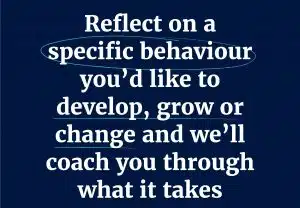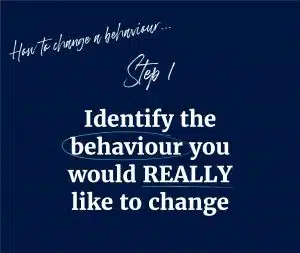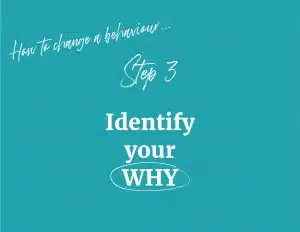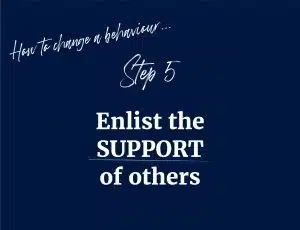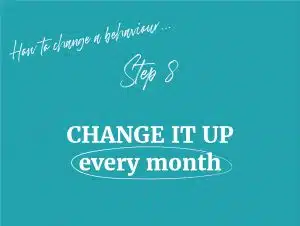How To Change A Behaviour
A few weeks ago, Sam walked into the office complaining “I don’t want to go to the gym”. Sam knew she should. Sam knew she’d feel better if she went. Sam knew the ideal gym workout. Sam had all her gear and a means of getting there.
So what was in the way of Sam getting to the gym?
In this instance, she just needed another person to help her move through a key moment of weakness, shift mood and get into the zone. She also benefitted from having someone help her identify a reward as a means of further motivating herself. In this case it was a caramel crown biscuit!
For the rest of us, we’re most likely to focus on changing a behaviour at the end of the calendar year as we prepare for the year that’s coming and the new version of ourself we’d like to ‘birth’. But, today, whatever time of year this article finds you, we’d like you to reflect on a specific behaviour you’d like to develop, grow or change and we’ll coach you through what it takes.
Step 1 – Identify the behaviour you would REALLY like to change.
Would you like to exercise more, eat less, sleep more, read more, spend more time with family, focus on a hobby, save for a vacation?
Step 2 – Make it SMART
Once you identify your thing, get specific. So instead of exercising more, make it a SMART Goal – Specific, Measurable, Achievable, Realistic and Timebound. In this instance, “I’d like to exercise 3 times per week for 40 mins per session.”
Step 3 – Identify your WHY
This is the KEY step. The most important aspect of any behaviour that you’re trying to stop or start is REALLY understanding and connecting with your why. If it’s exercise, why do you want to do it? To feel more energetic, look good, prepare yourself for ‘healthy older age’? The more ‘significant’ your why, the easier it can be to firmly ‘declare’ your new regime. Say for example, there’s evidence that aerobic exercise 3 times per week can reduce conditions like Alzheimer’s, this is a powerful motivating ‘why’ and can be a great catalyst for building your behaviour into a habit over time.
Step 4 – Make sure you know HOW
This step seems obvious, however, for the behaviour you choose, your competency to do it (or not) can influence your motivation to do it (or not). Let’s use saving for a vacation for this one. In order to be ‘good’ at this, there are lots of hidden skills, like budgeting, planning and even the skill of resisting a purchase if unsure of the status of your weekly budget. You might not consider this a skill, but the idea of developing mindfulness around spending or a mindset to pause and check before purchase can be critical to achieve savings goals. So, ask yourself, for the behaviour in focus, what are the skills I need to be really great at this?
Step 5 – Enlist the SUPPORT of others
Those people you live and work with can be the MOST influential when it comes to changing behaviour. This can work for you and against you. If you’re focused on exercise for example, having a lazy flatmate that wants to order Uber Eats and watch TV every night can be a negative social influence. Conversely, having a friend that wants to meet you at your front door 3 times per week for a walk can be a great enabler for behaviour change.
Identify the people who can support the behaviour you want to change and have a conversation with them about when and how they can help. Significant others and work colleagues can be great sources of motivation when you feel you need it most.
Step 6 – Engineer YOUR WORLD for success
There are many ways to re-arrange your environment to encourage yourself to enact your desired behaviour. Let’s talk about sleep here. Turning off notifications, not taking the phone into the bedroom, making sure your room is clear of electronic devices, fitting effective block out curtains and ensuring a space that promotes restoration are all examples of ‘engineering’ a space conducive to sleep. For other behaviours like exercise, having your shoes and clothes ready the night before and sticking an image of yourself looking fit, lean and happy on your door can be ways you use space and cues to inspire the behaviour you want. You might even set up a vision board that reminds you of your ‘why’. The space you create and the way you remind yourself of what you want to be doing and why can all positively shape your behaviour. A note on food here for the dieters – it’s easier if you don’t have temptation in the house! Try and engineer out your ‘naughty treats’ and that extra effort it takes to go and buy a late night treat may be the very thing you need to stop the habit of reaching for something unhealthy. Swap your sweet treat for an apple and learn to love that apple instead.
Step 7 – CELEBRATE your successes
It’s important for all of the activities, conversations and steps along the way to celebrate your successes. Make sure you choose a reward that’s meaningful for you (and one that does not undo all the positive work). If you’re saving $150 per week, perhaps you might ‘treat yourself’ with a $50 massage every second week, so that the net benefit of savings is $250 per fortnight. If you’re exercising 3 times per week, perhaps you might invest in a cool new running top as a reward, so you feel great when you’re doing it. If you have a special person that’s been helping you with your behaviour, maybe you can take them for a meal to say ‘thanks’ for their help?
Step 8 – CHANGE IT UP every month or so
There’s an old saying that it takes 21 days to change a behaviour and begin building a habit. Let’s move that out to say 4 weeks. We encourage you to keep it fresh and ‘change it up’ every month or so. If it’s working for you, keep going, but if you’re drifting in and out or the behaviour is waning, take a look at what’s working and what’s not and see what elements of your plan you can change, or focus on more.
Changing behaviour is a combination of will and skill and the formula for success is different for everyone.
If you’re trying something out, make sure you shape it around what motivates and inspires you. Enlist others to support you and keep on with your experiment until you see results.
Let us know how you go! Maybe, like Sam, you’ll find just a little tweak to arrive at your success formula.

